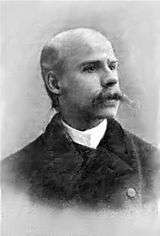Charles Swinnerton Heap
Charles Swinnerton Heap (10 April 1847 - 11 June 1900) was an English organist, pianist, composer and conductor.[1]

Life
Heap was born in Birmingham in 1847 and educated at the town's King Edward VI School, where he studied the organ under Walter Brooks.[1] At the age of 11 he performed as a boy soprano at the 1858 Birmingham Festival, the first conducted by William Stockley.[2] In 1862 he went to study under Dr. Edwin George Monk at York Minster. In 1865 he won the Mendelssohn Scholarship for young composers.
He then studied at the Leipzig Conservatoire, and then St John's College, Cambridge where he was awarded Mus Bac. in 1871 and Mus.D in 1872.[3]
In 1884 he was appointed Examiner for Music Degrees at his alma mater, Cambridge University. He later taught at the Royal College of Music where one of his notable pupils was organist Herbert Sanders.
Heap was the most important early patron of Edward Elgar, commissioning his work King Olaf, an important breakthrough in his career. Elgar later wrote that without Heap he would have "remained in outer darkness", and dedicated his Organ Sonata and the oratorio The Light of Life to him.[4]
After Heap's death the composer Havergal Brian wrote to the secretary of the Royal Philharmonic Society, comparing Heap favourably to the better-known Frederic Cowen and Alexander Mackenzie: "What was the old Phil doing to miss such a genius? Cowen, Mackenzie and Co. weren't within a thousand miles of Heap – who died unknown outside the Midlands."[5]
His memorial was sculpted by Albert Toft, and is in Walsall Town Hall.
A printed booklet of his testimonials relating to his job application to be the organist at Birmingham Town Hall in 1868 is kept at the University of Birmingham, Cadbury Research Library.
Appointments
- Organist of Queen's College, Birmingham (a predecessor college of the University of Birmingham) (1859 - 1862)
- Organist of St John's Church, Wolverhampton (1868 - ????)
- Conductor of the Birmingham Philharmonic Union (1870 - 1886)
- Conductor of the Wolverhampton Festival Choral Society (1881 - 1886)
- Conductor of the North Staffordshire Festival, Hanley (1888 - 1899)
- Conductor of the Birmingham Festival Choral Society (1895)
- Conductor of the Birmingham Triennial Music Festival (1897)
- Conductor of the Walsall Philharmonic Union.
Compositions
His compositions include cantatas, anthems, songs, overtures, organ music.
References
- Brown, James Duff; Stratton, Stephen Samuel (1897), "Heap, Charles Swinnerton", British musical biography: a dictionary of musical artists, authors and composers, born in Britain and its colonies, Birmingham: Stratton, p. 193, OCLC 645238475, retrieved 2017-10-28
- Allen, Gordon C. (2012), "Dr. Charles Swinnerton Heap, Composer, Organist, Composer and Conductor" (PDF), Journal of Swinnerton Family History, Swinnerton Family Society, 15 (1): 11–12, retrieved 2017-10-29
- "Heap, Charles Swinnerton (HP869CS)". A Cambridge Alumni Database. University of Cambridge.
- Hughes, Meirion; Stradling, Robert (2001), The English Musical Renaissance, 1840-1940: Constructing a National Music, Music and Society, Manchester: Manchester University Press, p. 61, ISBN 0719058309, retrieved 2017-10-27
- Nettel, Reginald (1976), Havergal Brian and his music, London: Dobson, p. 17, ISBN 023477861X